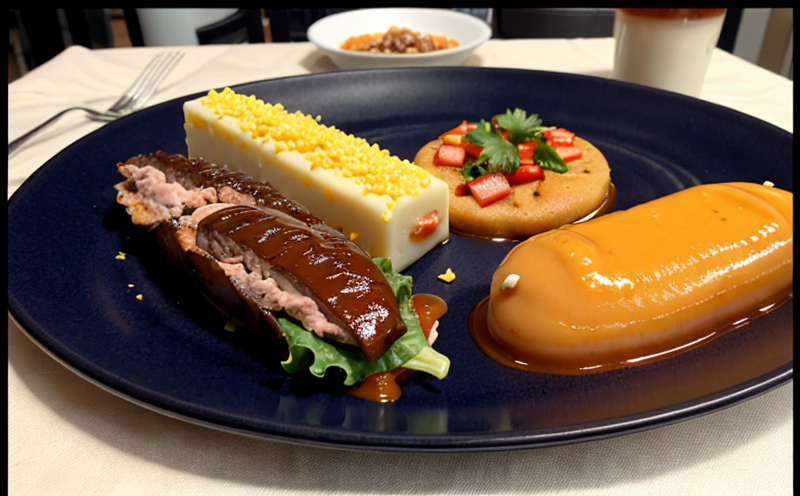EU 10/2011 Simulant B Migration Test
The EU Directive 10/2011 on food contact materials (FCM) sets stringent requirements for the safety and compatibility of packaging with foodstuffs. This directive aims to ensure that all materials in direct or indirect contact with food do not release harmful substances into the food, thus protecting public health.
The Simulant B migration test is a critical part of this compliance process. Simulant B, as specified by ISO 10350-2:2019 and EU Directive 10/2011, simulates the conditions under which foodstuffs might come into contact with packaging materials. This includes testing for the migration of substances from packaging to food due to physical or chemical interactions.
The test is conducted using Simulant B, a standardized aqueous solution that mimics acidic and neutral conditions typical of food products like fruit juices, soups, and dairy products. The testing process involves placing the packaging material in contact with this simulant for a specified duration before analyzing any potential migration.
The importance of this test cannot be overstated. It helps to identify whether there are any risks associated with the use of certain materials in food packaging, ensuring that only safe and compliant products reach consumers. Compliance with EU Directive 10/2011 is not just about avoiding penalties but also upholding consumer trust and maintaining a reputation for high-quality, safe products.
Our laboratory specializes in conducting this test according to the latest standards and guidelines set by international bodies like ISO and EU. We use state-of-the-art equipment and follow stringent protocols to ensure accurate results that are reliable and repeatable. Our team of experts ensures that every step of the process adheres strictly to regulatory requirements, providing you with comprehensive reports and insights into your packaging's safety.
The Simulant B migration test is essential for ensuring that all materials used in food contact are safe and do not pose any risks to consumer health. By performing this test, businesses can demonstrate their commitment to quality and compliance, thereby enhancing brand reputation and customer trust. It is a crucial step towards maintaining the integrity of the supply chain and protecting public health.
The results from this testing play a vital role in product development and design decisions. Understanding how different materials perform under various conditions helps manufacturers make informed choices about material selection and process optimization. This not only ensures regulatory compliance but also contributes to sustainable practices by reducing waste and improving efficiency throughout the manufacturing process.
Applied Standards
- ISO 10350-2:2019: This international standard specifies the methods for determining migration of substances from food contact materials to food simulants. It provides detailed procedures for conducting both short-term and long-term tests, which are essential in ensuring compliance with EU Directive 10/2011.
- EU Directive 10/2011: This directive establishes the framework for assessing the safety of materials used in food contact applications. It mandates that all such materials must be proven safe and non-toxic before they can enter the market, making this migration test a cornerstone of compliance.
The combination of these standards ensures that our testing practices are both rigorous and internationally recognized, providing you with confidence in the accuracy and reliability of your results. Our commitment to adhering strictly to these guidelines guarantees that every aspect of your packaging's safety is thoroughly evaluated, leaving no room for doubt regarding its compliance status.
Benefits
- Avoids Regulatory Penalties: By ensuring strict adherence to EU Directive 10/2011 and ISO standards, you can avoid costly fines and other penalties associated with non-compliance.
- Enhances Consumer Trust: Demonstrating compliance through our rigorous testing process helps build trust among your customers and stakeholders. This is especially important in the food industry where safety concerns are paramount.
- Promotes Sustainable Practices: Understanding how different materials behave under various conditions allows for more informed decision-making regarding material selection, which can lead to reduced waste and improved efficiency.
- Improves Product Quality: Our testing ensures that your packaging does not release harmful substances into foodstuffs, thereby enhancing the overall quality of your products.
Quality and Reliability Assurance
At our laboratory, we pride ourselves on offering unparalleled quality assurance services. Our commitment to excellence is reflected in every aspect of our operations, from specimen preparation to final report generation.
We employ highly trained professionals who have extensive experience in food contact materials testing. Using cutting-edge technology and methods, we ensure that each test is conducted under controlled conditions that replicate real-world scenarios as closely as possible.
Our robust quality management system is ISO 9001 certified, ensuring that all processes are documented, reviewed regularly, and continuously improved. This systematic approach guarantees consistent high standards across every service we provide.
Once the testing is complete, our reports are comprehensive, providing detailed insights into your packaging's performance under various migration conditions. These reports serve as valuable tools for both regulatory compliance and internal quality control purposes. They help you make informed decisions about future product development and production processes.
We also offer additional services such as ongoing monitoring of trends in food contact materials regulations, which can be crucial for staying ahead of changing requirements and maintaining a competitive edge in the market.





